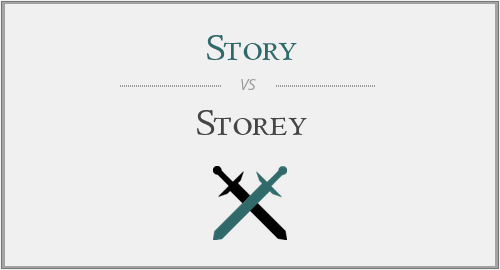Dealing with similar spellings of various words, using them correctly and avoiding misspelling is often overwhelming; though it gets easier once you sort out which spellings refers to what. If you are in doubt about “story” and “storey”, we’ll help you out.
Did you know that “story” and “storey” can almost always replace one another? Broadly, regardless of their spelling, they mean and refer to the same things. Though “story” is often believed to hold a unique signification, both versions have two diverse meanings indicated by the context where they are used. Let’s clearly distinguish them in order to avoid any further confusion!
Story vs. Storey
If you have your Word Document set up in US English, it might be very possible that the program will underline “storey” in red, telling you it’s misspelled. Actually, it’s not really. It’s just the spelling difference between UK English and US English. “Storey” is usually used by the British, while US only accepts the “story” spelling.
In other words, there is no notable difference between “story” and “storey”, other than personal preference and popular belief.
When do we use “story”?
“Story” can be used with multiple meanings, all related and similar. In general, “story” is a true or imaginary description of connected events; it can also refer to a newspaper report; thirdly, “story” can also be used with the meaning of “lie”. In all its appearances, “story” functions as a noun. Last but not least, “story” can also refer to a level of a building. In this form, the word is less frequently used, because we have the words “level” to replace it. Even so, it is a correct form that you might find in certain texts. The only thing to remember is that “story” only appears in this form when referring to a building level, in UK English. “Story” is the spelling that British English always prefers.
Example 1: Tell me a story before I fall asleep. – “story” refers to an imaginary description of connected events.
Example 2: There was an interesting story in the newspaper, about yesterday’s meeting between the president and the prime-minister! – “story” refers to a newspaper report.
Example 3: Her nose turned red, her voice was trembling and I already knew that the truth was different than what she was telling; it was obvious she was telling me a story. – “story” refers to a lie.
Example 4: The car you are looking for is parked at the second story of the building. – “story” can also be used to replace “a building level”, in UK English.
When do we use “storey”?
As we already mentioned, “storey” is used exactly in the same contexts as “story”. The only difference between their meanings is that “storey” appears written like this in American English only. Do not use this in UK unless you want to be corrected immediately. “Storey” is frequently used with this spelling in US English alone.
Example 1: Tell me a storey before I fall asleep. – “storey” defines an imaginary description of connected events.
Example 2: There was an interesting storey in the newspaper about the elections this year. – “storey” refers to a newspaper report.
Example 3: I already knew the truth was something else and he was telling me a storey to hide the reality. – “storey” can be used instead of the word “lie”.
Example 4: The car you are looking for is parked at the second storey of the building. – “storey” is the American spelling of the word, referring to the level of a building.
Conclusion
One more thing to remember, the only notable difference between “story” and “storey” is represented their plural forms. “Story” in plural is spelled “stories”, whereas “storey” in plural form is spelled “storeys”.
While both “story” and “storey” are correct and synonyms, it is good to remember that “story” is used more frequently than “storey” to define a series of connected events, real or imaginary, related be someone, whereas “storey” is more often used when referring to the level of a building, especially in American English. Even so, if you replace these words, you will not me grammatically wrong; you simply need to remember when and how to spell these words according to the British/American context, for more linguistic elegance.





Have a discussion about this article with the community:
Report Comment
We're doing our best to make sure our content is useful, accurate and safe.
If by any chance you spot an inappropriate comment while navigating through our website please use this form to let us know, and we'll take care of it shortly.
Attachment
You need to be logged in to favorite.
Log In